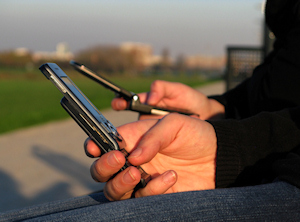 True confession time: I LOVE my local library! If it was a woman, I would totally marry her and make sweet, sweet love to her every night. That is, if she were super-hot, athletic, sandy-blonde, funny, smart and ummm, oh yeah… didn’t mind me picking my toenails in bed.
True confession time: I LOVE my local library! If it was a woman, I would totally marry her and make sweet, sweet love to her every night. That is, if she were super-hot, athletic, sandy-blonde, funny, smart and ummm, oh yeah… didn’t mind me picking my toenails in bed.
But even if she wasn’t any of those things I would still commit my undying respect and admiration for her. Especially because my local library was forward-thinking enough to secure the live streaming rights for TED2013 happening in Long Beach, California all this week.
You see, I don’t have the $7,500 registration fee you need to attend in person. Nor do I feel my application would have grabbed the slightest amount of attention when compared to the high-powered, caffeine-driven executive CEO’s that get in the door each year.
So what’s the point of this post? Oh yeah, I’m getting to that.
Basically, I just sat in on the session with John McWhorter who’s a linguist examining the culture (and meaning) of our abbreviated text message communications in modern society. John gave an incredibly interesting TED talk and here are some of the takeaways that stuck with me…
For centuries now, educators, scholars, business leaders and others have argued that society’s inability to clearly write (in long form) has and will continue to have adverse effects on our ability to communicate. John addresses this point with a keen observation about text messaging being less about “writing” as it is a language in and of itself. While abbreviations and cultural jargon in text messages might seem archaic, they are in fact a miraculous form of speech.
In the past, speech was more formal and often spoken as if one were talking with the same verbiage they would write. But now it seems that society is more interested in quite the opposite (i.e. writing how we speak). And today’s mobile phones have actually created the conditions necessary to receive messages in a form that mimics how we speak.
When you look closely at examples of typical fingered speech (i.e. text messages) your gut might first indicate that something is wrong with the sender. But upon closer examination, you’ll find the abbreviated acronyms and symbols we use to convey ideas is actually demonstrating emergent complexity of thought.
But with new language comes a new structure. For example, John addressed the commonly used letter combination “lol.” Many of us might initially recognize this as an abbreviation of “laugh out loud” and used to express humor in our message when something made us chuckle. But what it really does, in true linguistic form, is demonstrate pragmatic language skill.
Since in-person conversation involves so much more than just words (for example, body gestures, voice inflection, facial expression, etc.) we’ve had to find other ways to portray these things when communicating via text.
So as many might see texting as the downfall of writing, what is really happening with the spread of these messages can be considered evidence of an expanded linguistic repertoire.
An entirely new language has essentially developed through the use of mobile technology. And it’s happening right under our noses. Folks like Mr. McWhorter describe this as a “linguistic miracle.”
So go ahead and feel communicatively advanced the next time you send a message that reads:
BTW, I’m TOY + the FNG UR with. LMAO
P.S. if you liked this post, you’re going to LOVE ME HERE! Please consider receiving my posts via email.